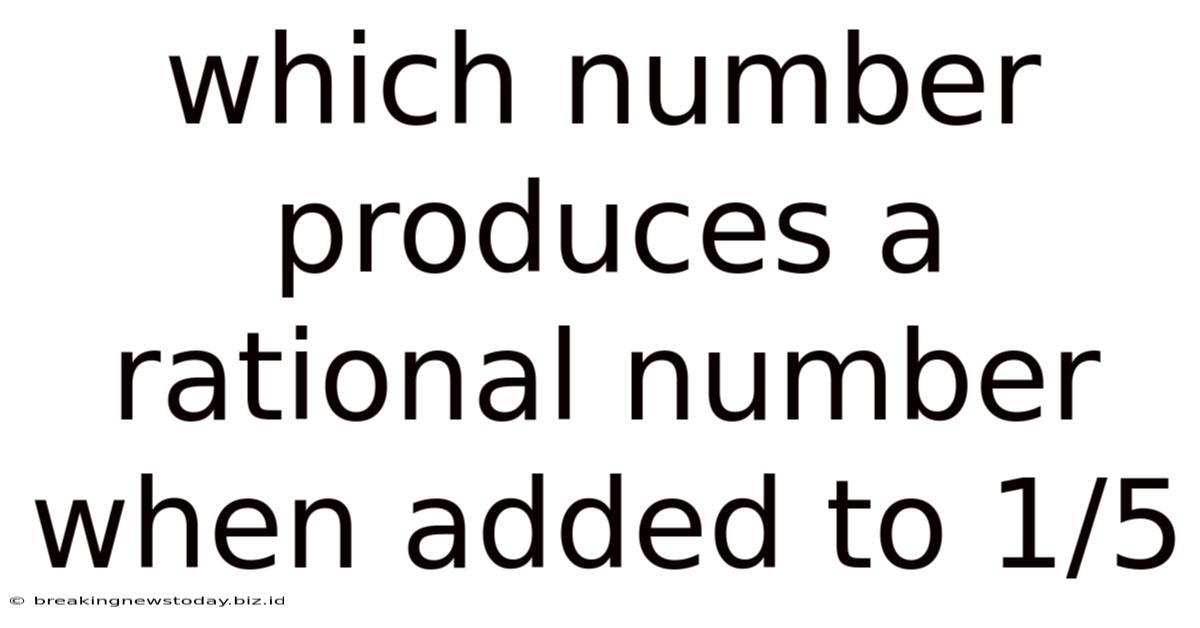Which Number Produces A Rational Number When Added To 1/5
Breaking News Today
Jun 05, 2025 · 4 min read

Table of Contents
Which Number Produces a Rational Number When Added to 1/5?
Adding a number to 1/5 and getting a rational number might seem like a simple question, but it delves into the fascinating world of rational and irrational numbers. This exploration will not only answer the core question but also provide a deeper understanding of number systems and their properties.
Understanding Rational Numbers
Before diving into the specifics, let's clarify what a rational number is. A rational number is any number that can be expressed as a fraction p/q, where p and q are integers, and q is not zero. This seemingly simple definition encompasses a vast range of numbers, including:
- Integers: Whole numbers (positive, negative, and zero) are rational because they can be written as a fraction with a denominator of 1 (e.g., 5 = 5/1, -3 = -3/1).
- Fractions: These are the most obvious examples of rational numbers (e.g., 1/2, 3/4, -7/9).
- Terminating Decimals: Decimals that end after a finite number of digits are rational (e.g., 0.75 = 3/4, 0.2 = 1/5).
- Repeating Decimals: Decimals with a pattern of digits that repeat infinitely are also rational (e.g., 0.333... = 1/3, 0.142857142857... = 1/7).
The Core Question: Adding to 1/5
Our central question asks: which numbers, when added to 1/5, result in a rational number? The answer, perhaps surprisingly, is any rational number.
Let's explore why. Suppose we have a rational number 'x'. We can express 'x' as p/q, where p and q are integers, and q ≠ 0. Now, let's add 'x' to 1/5:
1/5 + x = 1/5 + p/q
To add these fractions, we find a common denominator, which is 5q:
(q + 5p) / 5q
Since p and q are integers, (q + 5p) is also an integer. The denominator, 5q, is also an integer (as long as q ≠ 0, which is already a condition for 'x' to be rational). Therefore, the result (q + 5p) / 5q is a fraction where both the numerator and denominator are integers, fulfilling the definition of a rational number.
This proves that adding any rational number to 1/5 always yields another rational number.
Irrational Numbers and the Sum
Now let's consider the scenario where we add an irrational number to 1/5. An irrational number cannot be expressed as a simple fraction p/q. Examples include π (pi), e (Euler's number), and the square root of 2 (√2).
If we add an irrational number 'y' to 1/5:
1/5 + y
The result will always be an irrational number. This is because the sum of a rational number and an irrational number is always irrational. To understand this, let's assume the opposite – that the sum is rational. If 1/5 + y = z, where z is rational, then we could solve for y:
y = z - 1/5
Since z and 1/5 are both rational, their difference (z - 1/5) would also be rational. But this contradicts our initial assumption that y is irrational. Therefore, the sum of 1/5 and any irrational number must be irrational.
Illustrative Examples
Let's illustrate these concepts with some examples:
Adding Rational Numbers:
- 1/5 + 2/3 = (3 + 10) / 15 = 13/15 (Rational)
- 1/5 + (-1) = -4/5 (Rational)
- 1/5 + 0.75 = 1/5 + 3/4 = (4 + 15) / 20 = 19/20 (Rational)
- 1/5 + 0.333... = 1/5 + 1/3 = (3 + 5) / 15 = 8/15 (Rational)
Adding Irrational Numbers:
- 1/5 + π ≈ 3.34159... (Irrational)
- 1/5 + √2 ≈ 1.64142... (Irrational)
- 1/5 + e ≈ 3.071828... (Irrational)
The Implications and Further Exploration
This seemingly simple addition problem highlights fundamental concepts in number theory. Understanding the properties of rational and irrational numbers is crucial for various mathematical disciplines, including calculus, analysis, and abstract algebra.
This exploration also opens doors to further inquiries:
- Operations with other rational numbers: The same principles apply when adding 1/5 to any rational number – the result will always be rational. Similar reasoning applies to subtraction, multiplication, and division (excluding division by zero).
- Density of rational numbers: The fact that we can always find a rational number between any two rational numbers demonstrates the density of rational numbers on the number line.
- Closure properties: The set of rational numbers is closed under addition, subtraction, multiplication, and division (excluding division by zero). This means that performing these operations on rational numbers always results in another rational number.
Conclusion: A Deep Dive into Number Systems
The seemingly straightforward question of which number added to 1/5 produces a rational number leads us to a deeper appreciation of the nature of rational and irrational numbers. The answer—any rational number—underlines the closure property of rational numbers under addition. Conversely, adding an irrational number will always yield an irrational sum. This exploration reinforces the fundamental concepts of number systems and provides a solid foundation for further mathematical investigations. The seemingly simple operation reveals a wealth of mathematical properties and intricacies. Understanding these properties is key to tackling more advanced mathematical concepts and problem-solving.
Latest Posts
Latest Posts
-
What Is 125 638 Rounded To The Nearest Hundredth
Jun 06, 2025
-
Accurately Measure Approximately Within 10 1 00 G Of Sodium Hydroxide
Jun 06, 2025
-
How Many Times Does 9 Go Into 18
Jun 06, 2025
-
I D Rather Move On Than Spend Time Double Checking Work
Jun 06, 2025
-
A Tall Open Container Is Full Of Glycerine
Jun 06, 2025
Related Post
Thank you for visiting our website which covers about Which Number Produces A Rational Number When Added To 1/5 . We hope the information provided has been useful to you. Feel free to contact us if you have any questions or need further assistance. See you next time and don't miss to bookmark.